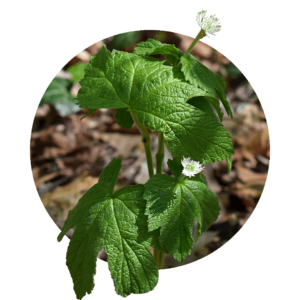Abdominal pain, diarrhea and bloating - these are all very unpleasant signs of an overstrained intestine. But what causes these symptoms in the first place and what can you do about bowel problems? We reveal this and much more in this blog post, which is all about gut health and gut cleansing. We also explain what leaky gut syndrome is all about and which physical warning signs you should be on the lookout for.
With natural methods, such as the individual spagyric mixtures from Zimply Natural, your complaints can be relieved naturally and sustainably.
Table of contents
- What exactly is gut health?
- Why is gut health so important?
- If you have these symptoms, you should consider a bowel cleanse
- These aspects can influence your gut health
- What is leaky gut syndrome?
- These are possible approaches for intestinal cleansing
- These medicinal plants can support your gut health
- Zimply Natural - Your natural booster for your gut health
- FAQ: Questions and answers about gut health
What exactly is gut health?
Your gut health encompasses many individual aspects, such as gut flora, microbiome, bacteria and nutrients. You may be wondering how these are all connected, so let us briefly explain. Intestinal flora and the microbiome refer to the same thing, the second term is just newer. Many microorganisms such as bacteria, viruses and fungi can be found in the intestine, which together form the intestinal flora. A balanced microbiome is essential for the absorption of nutrients, protection against harmful microorganisms and the regulation of the immune system. This aforementioned balance, or imbalance, can be influenced by diet, harmful substances or stress. This in turn has certain consequences, such as flatulence, diarrhea, constipation or even inflammatory bowel disease. It is therefore very important to have a balanced lifestyle and to keep the intestinal flora in balance. If you have problems with this and need ideas or approaches to counteract these complaints naturally, you've come to the right place.
That your gut health can also affect other organ systems?
This includes the immune system and, in some cases, the nervous system.
Why is gut health so important?
Effective nutrient absorption and the role of the immune system
Intestinal health is of course important for more aspects than previously mentioned. Most nutrients are absorbed from your food into the bloodstream in the intestine and for this to work, the intestinal wall must of course be in good condition. A healthy intestinal wall allows all the vitamins, minerals, proteins and other vital nutrients to be absorbed efficiently. However, not only are many nutrients absorbed in the intestine, but some substances are also excreted. In addition to good nutrients, there are of course also toxins and harmful substances. Whether you knew it or not, a large part of the Immune system is actually localized in the intestine. A balanced intestinal flora helps the immune system to fight off harmful microorganisms. It also strengthens the immune system, which means that it is generally better able to fight diseases.
The gut-brain axis and energy production
You may have heard of the gut-brain axis. This refers to the connection between the gut and the brain and explains the phenomenon of the influence of gut health on the psyche. A healthy gut can have a positive effect on mental health. However, a disturbed microbiome has often been linked to mental illness. Of course, general well-being can also be affected by unpleasant problems such as constipation, diarrhea or the Irritable Bowel Syndrome are influenced. Your body also lacks energy if the intestinal wall cannot absorb the nutrients well. This is because your body draws its energy from the nutrients in the food you eat. Accordingly, impaired intestinal health can lead to a lack of energy and fatigue.

If you have these symptoms, you should consider a bowel cleanse
Symptoms that may be a warning signal
Signs that a bowel cleanse is needed can have many different effects. The most obvious symptom is digestive problems, including constipation, diarrhea, bloating or irregular bowel movements. If these problems are persistent or occur more often than usual, this should alert you. If these problems occur mainly after eating certain foods, you should think about a food intolerance. First and foremost, you should discuss these symptoms with your doctor to determine whether you have an intolerance or digestive disorder. As we have already mentioned, the immune system is also closely linked to the intestinal flora. So if you suffer from frequent or recurring infections in the digestive tract, this may indicate a weakened immune system in the gut. In addition, general tiredness and a persistent lack of energy can also indicate impaired intestinal flora and limited nutrient absorption. You have probably already heard the next warning signal, as poor skin condition can also indicate impaired intestinal health.
Precautionary measures and consultation with a doctor before a bowel cleanse
There are some warning signs that you should definitely go to your doctor first before starting a gut cleanse. These include important issues such as weight problems, irritable bowel syndrome (IBS), allergies and immune problems, psychological symptoms and frequent use of antibiotics. Weight problems can include weight gain and weight loss and refer to difficulties in weight management, which may indicate a disturbed intestinal flora. Irritable bowel syndrome can have very painful effects such as abdominal pain, cramps, bloating and changes in bowel movements. An intestinal cleanse could possibly help with these. Immune problems and allergies or intolerances can be a symptom of disturbed intestinal flora, as previously mentioned. Problems with gut health can also have an impact on mental health. Here they can lead to symptoms such as mood swings, anxiety or depressive moods. Repeated use of antibiotics can disrupt the intestinal flora; in such cases, targeted intestinal rehabilitation can be considered.
That some studies have linked a disturbed intestinal flora in pregnant women with an increased risk of premature birth?
These aspects can influence your gut health
Influence of nutrition on intestinal health
Diet is probably the most obvious aspect that has a direct influence on intestinal health. A diet rich in fiber promotes intestinal health, as it supports intestinal movement and promotes the formation of short-chain fatty acids. These in turn influence the intestinal flora. Foods such as yogurt, kefir and sauerkraut contain probiotics and can have positive effects on the intestinal flora. Foods such as garlic, onions and bananas act as prebiotics, as they can promote the growth of good bacteria in the gut.
Influence of medication intake, lifestyle, environmental factors and genetics on intestinal health
Excessive use of antibiotics can have the effect of killing off not only harmful bacteria but also beneficial bacteria in the gut. This disrupts the intestinal flora, as does the use of non-steroidal anti-inflammatory drugs, as these can affect the intestinal mucosa. Chronic stress and chronic sleep deprivation can have a negative impact on gut health as they can affect the balance of the gut flora. One point that you probably don't even think about, but which definitely affects some people, is gastrointestinal surgery. This and other abdominal operations can have a significant impact on intestinal health. Autoimmune diseases such as coeliac disease or Crohn's disease can also affect your intestinal flora. An obvious influencing factor is excessive alcohol consumption and Tobacco consumptionas these can have a negative effect on your intestines. They can weaken the intestinal barrier, which impairs the absorption of nutrients. At the same time, toxins and harmful substances can also enter the bloodstream more easily and trigger inflammation in the body.

The application of your Darm care sprays iBy the way, the treatment is very simple: the spray is simply sprayed into the mouth according to the dosing instructions on the bottle. In order to achieve the best possible effect and to be able to optimally counteract the causes, we recommend using it over a longer period of six to eight weeks. As a kind of cure, spray 3×3 sprays daily.
What is leaky gut syndrome?
The Leaky gut syndrome is a theory that states that some people have a disturbed barrier function of the intestinal wall. This can lead to substances that would not normally be absorbed passing through the intestinal wall into the bloodstream. The syndrome is also known as increased intestinal permeability and an unbalanced diet, alcohol consumption, chronic stress and certain medications may be risk factors. Due to the weakening of the intestinal wall, toxins and bacteria can enter the bloodstream and consequently lead to disease patterns. These are likely to include allergies, autoimmune diseases, inflammation and even neurological disorders.
These are possible approaches for intestinal cleansing
How approaches that revolve around your diet work
If you are planning a bowel cleanse and everything necessary has been clarified with your doctor, there are various approaches that can be considered. The first is to change your diet, which involves eating a high-fiber diet that is also rich in pro- and prebiotics. This means lots of fruit, vegetables, wholegrain products, pulses and nuts for the fiber. Probiotics are found in yogurt, kefir, sauerkraut and kimchi, while prebiotics are found in garlic, onions, leeks and bananas, for example. For detoxification and cleansing, it is advisable to drink plenty of water or tea. Herbal teas with detoxifying properties such as ginger, turmeric, peppermint, dandelion and nettle can help to cleanse and support the intestines.
Intestinal cleansing through exercise and stress management
Regular exercise is essential for long-term intestinal health, as it stimulates blood flow to the intestines. It also helps to transport the digested food further and empty the bowel. As a result, not too much fat accumulates and digestion is facilitated. This also stimulates the general metabolism. Stress management techniques such as meditation, yoga, breathing exercises and progressive muscle relaxation can also contribute to muscle relaxation and bowel movement. Because when the stomach is tense through and through, it often leads to abdominal pain and digestive problems. You've probably experienced this too.
That an unbalanced intestinal flora in children can be associated with an increased risk of food allergies?
These medicinal plants can support your gut health
Whether you have diarrhea or constipation, the active digestive glands are usually involved, even if there is no infection. The active digestive glands include your liver and pancreas. So it's always good to think about these two and look after them when you have such problems. Milk Thistle-Tea is a good option here. You use the power of the plant and drink plenty of fluids. It couldn't be better!
Mercury has a germicidal effect, as bacteria readily absorb this heavy metal and die after being poisoned. This makes it easier for the immune system to defeat them and render them harmless. Mercury also stimulates and strengthens the lymph. As a result, chronic infections can be overcome and the cause of some muscle and joint pain disappears.
Hydrastis can help with that annoying empty feeling in the stomach. It stimulates the metabolism and appetite and transforms the feeling of emptiness into a real appetite. This stimulates digestion and relaxes the digestive organs. Goldenseal root also helps with constipation, as it stimulates bile production. This balances the pH value and the enzymes do their work again.
Bolus alba can be a miracle cure for stomach problems. It binds excess acids, soothes the mucous membranes and relieves inflammation. Kaolin relaxes the muscles of the stomach and bile ducts and thus supports the flow of digestive secretions from the liver into the intestine. This allows the stomach to work effectively again to digest food.
The stomach is a huge hollow muscle that massages and mixes the chyme we eat. This can cause the stomach muscle to spasm. The anticholinergic effect of the alkaloids of the Mandrake This means that the nervous system no longer stimulates the muscle. The stomach can relax and the cramps subside.
If too many digestive toxins circulate in the intestine, this can affect the intestinal mucosa and also the pancreas. This is then easily irritated and you get soft stools, abdominal pain and diarrhea. These toxins occur because the ratio of bacteria in the intestine is no longer correct, i.e. the intestinal flora shifts. Okoubaka activates the pancreas and thus helps to normalize this flora.
Zimply Natural - Your natural booster for your gut health
With Zimply Natural, we are the antidote to painkillers, sleeping pills, and standard medications. We are your medicine! For our mixtures we use the centuries-old natural healing method of spagyric back. The Spagyric combines the herbal active ingredients and phytotherapeutic elements of the HealingplantsThe mineral salt qualities, as well as the subtle information of the medicinal plants and the energetic potential of the Bach flowers.
With natural methods, such as the individual spagyric mixtures from Zimply Natural, your complaints can be relieved naturally and sustainably.
FAQ: Questions and answers about gut health
Can a low FODMAP diet be helpful for intestinal problems?
Yes, a low-FODMAP diet can help with certain intestinal problems, especially irritable bowel syndrome. FODMAPs are fermented carbohydrates found in some foods. These include yogurt, sauerkraut, sourdough bread, beer and soy sauce. In people with an intolerance, such foods lead to flatulence, abdominal pain and irregular bowel movements. Low FODMAP diets are particularly recommended for irritable bowel syndrome and are one of the typical treatment methods.
Can environmental pollution affect gut health?
Yes, it is believed that environmental pollution has an impact on gut health. Studies indicate that environmental toxins and air pollution promote a disturbed intestinal flora. This in turn can be linked to other gut problems. Certain pollutants can even damage the cells of the digestive tract and affect the intestinal barrier function. This can lead to an increased risk of leaky gut syndrome.
Can bowel cancer be prevented?
Partly, you can't prevent bowel cancer 100%, but you can definitely know the risk factors and avoid them. These include alcohol, tobacco consumption, consumption of red meat and processed meat products and genetics. This last point can be clarified and prevented by taking a family history. A diet rich in fiber is preventive, including foods such as fruits, vegetables and whole grains.















